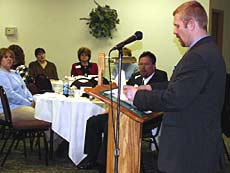|
Even though medical professionals have
spoken up publicly about the hazards of using it, ephedra is still
out there.
Even though it can kill, ephedra is
still out there and can be purchased by anyone -- a 12-year-old kid
who wants a cheap high, an athlete who wants the extra edge, a girl
who wants to lose weight or a 50-year-old truck driver who wants to
stay awake.
Kevin and Debbie Riggins, Sean's
parents, and Logan County Coroner Chuck Fricke are trying to change
that.
They are getting the word out about the
risks of taking the herbal supplement, and they are asking state and
federal legislators to change the laws that allow this and other
products to be sold over the counter, especially to young people,
without any regulation from the federal Food and Drug
Administration.

On Thursday they took their message to
the hundred or so members of the Logan County community who met to
hear the semiannual report to the community from the Healthy
Communities Partnership.
Fricke explained to the audience why a
potentially life-threatening substance like ephedra can be sold over
the counter today.

"To assure safety, the FDA used to
regulate dietary supplements. We used to assume that if it is sold
over the counter, it is safe," he said.
Then came 1994 and the Dietary
Supplement and Health Education Act, or DSHEA. That act stripped the
FDA of its power to regulate dietary supplements by classifying them
as food, not drugs. So Stackers, Yellow Jackets, Black Beauties and
dozens of other pills containing multiple stimulants can now be sold
without any regulation.
"Medical organizations such as the
board of trustees of the American Medical Association warn against
it, saying there is no benefit in using the drug. Doctors don't
prescribe it because of the severe side effects. The Department of
Health and Human Services gave a scathing criticism of it. Health
Canada calls it a Class I health risk and a toxic drug, but our
government hasn't been able to take action to ban ephedra," Fricke
said.
"I believe a strong lobby is part of
the reason DSHEA was passed," he added. "The supplement business is
a $2 billion industry. Right now, the dietary supplement industry
gets to decide if the pills it produces are safe.
"The fox is not only guarding the
henhouse, it gets to determine what constitutes a healthy hen."
Unless some changes are made, ephedra
may not be the only dangerous plant derivative to be sold in
attractively packaged pills to anyone young or old. Riggins told the
audience that the supplement industry is scouring the jungles and
forests of Africa and South America, looking for more plants that
can give people a psychotropic experience, a rush or a buzz, so they
can be marketed as dietary supplements to an unsuspecting public.
One of these new plants is salvia
divinorum, a Mexican herb that can produce hallucinogenic effects
like LSD does.
Even though selling these plant
substances is legal, Riggins considers it de facto drug pushing. "We
are not fighting the war on drugs hard enough," he said.

[to top of second column in
this article] |

There is no logic in government
agencies' thinking about ephedra, Riggins said. For example, under
the Illinois Controlled Substances Act, ephedrine is considered a
controlled substance. But this only applies to synthetic forms of
the drug, not to natural products, even though the chemical
properties are the same.
"They are saying the herb is safe but
the synthetic form is not," Riggins said.
Riggins and Fricke are working with one
Illinois legislator, U.S. Sen. Dick Durbin, to try to tighten up the
regulation of ephedra. After Sean's death, they went with him to
Washington to testify to a Senate subcommittee about the dangers of
the drug.
Riggins also talked recently to U.S.
Rep. Ray LaHood, who was appalled when he heard about ephedra and
the new herb, salvia. LaHood told Riggins he is going to talk to
Durbin about the situation.
Riggins said state Rep. Dan Brady,
R-Bloomington, is going to propose legislation in the Illinois House
to make it illegal to sell ephedra to those under 18. Rep. Rich
Brauer, R-Petersburg, is interested in sponsoring similar
legislation. Riggins is also working with state Sens. Larry Bomke,
R-Springfield, and Dan Brady, R-Bloomington.
"We seem to be getting through at some
levels, but it's not fast enough. We're going to lose another young
man, and we have probably already lost an athlete," Riggins said. He
was referring to Baltimore Orioles pitching prospect Steve Bechler,
who died recently after having taken a weight-loss drug containing
ephedra.
Riggins and Fricke are getting the word
out locally, talking to Lincoln Community High School students, but
they still see the need for more information and better regulation.
Fricke told of a nurse who had been
taking cold medicines and took her own blood pressure while showing
a patient how to do it. The nurse was shocked to see her own
pressure soaring; she didn't realize the cold medicines contained
ephedrine, which can cause a sudden rise in blood pressure.

Riggins said he had talked to high
school students, some of them friends of his son's, who still
haven't understood the dangers of ephedra. One young girl was using
it to lose weight so she could wear the same clothes as her friend.
On the positive side, Fricke said local
stores who sell the drug have seen sales to young people dropping
off. The main purchasers now, he said, are people ages 30 to 50 who
work second shift. They are using the drug to stay awake.

He said some stores in Lincoln have
chosen to stop selling the pills, some have put the pills behind the
counter so customers have to ask for them, but some still "just
don't care" and are selling them up front as they always did.
Riggins, who has founded the nonprofit
Sean Riggins Foundation for Substance Free Schools, said he and his
group want to work with HCP and other groups to keep young people
from using these dangerous drugs.
"There is
way too much in Logan County. There is way too much in our country.
I just can't see another death; I just don't want to see it happen."
[Joan Crabb]
More information and awards
from this meeting will be posted Tuesday February, 25.
|